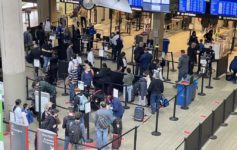So many people around the world have been infected with COVID-19 and recovered, others possess antibodies. If passengers have antibodies, should they be free to travel at will?
If you are considering booking travel or signing up for a new credit card please click here. Both support LiveAndLetsFly.com.
If you haven’t followed us on Facebook or Instagram, add us today.
In Theory, Travelers with Antibodies Should Be Immune
Little is known definitively about COVID-19 and it has the potential to change all the time. One leading theory is that those who have been infected with coronavirus hold an immunity that lasts around four months (though that was the length of the study so presumably that could be longer or even permanent.) That’s been upheld by the low re-infection rates – just five in the world and only one in the United States have been reinfected with COVID-19. The odds are around 1 in 10 million based on total infected which puts it in the anomaly territory. Chances of dying in an airplane crash, for example, is 1 in 11 million, becoming a billionaire in the US is far more likely at 1 in 785,000.
The problem with travel isn’t the threat of contracting the virus on an airplane alone, it’s the movement, and interaction with others that accompany travel that’s deemed to be the riskiest. Transporting to and from the airport, interacting with staff, the TSA, those dirty bins used for scanning electronics – those are much higher risk but remain a part of travel. If travelers are immune but touch the ticket desk, the TSA bin, a handrail, even though they may not be able to get sick, others who are suceptible could.
A new study, however, suggests that perhaps this might not be the case.
“What this means is that if people are reexposed to the virus, these cells, along with antibodies, will likely protect people from symptoms and further transmission.” – Nancy Schimelpfening; Healthline.com
It’s the last part of that statement, the result of an extensive study at the University of Washington, that holds the most weight. Much like wearing a mask is intended to protect others and not the wearer, the thought was that antibody holders might not be able to contract the virus again but could still infect others. This study suggests that’s unlikely.
Should Travelers With Antibodies Be Free to Travel?
Concern over travel is about the risk to travelers and the risk to others. Assuming the aforementioned study is valid, and the reinfection rate substantiates that at least since the beginning of COVID-19 known infections that it is, then should travelers with antibodies have any travel restrictions? Scientifically, at least according to these studies and doctors, would suggest that they pose no threat to themselves or others.
However, as none of the studies could possibly extend any longer than the first known infection, re-testing for antibodies may be necessary. Unfortunately, antibody testing is a blood test as opposed to a nasal mucus sample and cannot currently be done quickly and cheaply. That said, there is less of an immediate need for turn around as the studies have shown that it’s unclear if the antibodies will ever go away and make the traveler suceptible to both infection and transmission again.
I don’t see a reason at this point to restrict the movement of travelers with COVID-19 antibodies.
That’s a Lot of Travelers
As it stands now, there have unfortunately been 1.242 million COVID-19 linked deaths. A reader commented just last week that his own mother had died as a result of the virus. That’s terrible to hear. There is some good news, however. Every week mortality rates in the US have fallen in a significant way. Just over the last two weeks, mortality has dropped from 2.6 to 2.4% in the US and as cases increase (due in part to increased testing) treatment methods have improved and made it safer to contract the virus.
In the US alone 9.7 million have tested positive for the virus but 9.5 million would now have the antibodies. Globally, more than 48 million worldwide find themselves (at least for the time being) immune to infection and according to the study listed, immune from transmission. That would put an awful lot of people eligible to travel, work, and return to society as we knew it in 2019.
Conclusion
It’s difficult to take America out of the situation given that the US accounts for nearly 20% of infections and deaths. But ignoring the US for a moment, France and Germany were far stricter with regards to lockdowns, protocol and procedures, yet they’ve again locked down as cases have sharply risen. Sweden attempted a variety of models with mixed results.
We need to face a reality that COVID-19 may be with us forever. It’s also possible that by the time a vaccine is available the virus has so widely spread that its need is diminished. Should mortality rates continue to fall as precipitously as they have in recent weeks, it may also drop to a level in which contracting it is no longer a 1 in 45 chance of dying but far, far less. If travelers have antibodies, cannot themselves become ill with COVID-19 again nor can they infect others, there is little reason to hold them back from the world or society at large.
What do you think? Should people with antibodies be free to travel the world? Do we need to wait for further information? If so, how long do we wait to determine threat level and length of immunity?




Short answer… Yes!
Same for those who eventually get vaccinated.
Anyone who answers different is more concerned about their own agenda than logic or health.
The medical answer is no. People want to understand everything as black and white and that is not the reality. For example, Dr. Fauci said he would be happy if the vaccine was 70-75% effective. This is akin to the flu vaccine and should reduce the rate of infection. It does not mean you cannot catch Covid! Similarly, just because you test positive for antibodies does not mean you have enough to fight off a new infection. My daughter is a hospital doctor and says there is no way they would accept a person is immune due to presenting antibodies.
Not what you want to hear, but it is important to follow the science here.
The entire premise is invalid because the fundamental sticking point is antibody reslience, prevelance, and strength so far have proven not to be uniform. Some people lose it quicker than others. Some people have it weaker than others. Re-infections have now been documented. In that respect it is more like the Flu…you can get it again.
If this holds up, then it’s impossible to have a uniform policy that categorically has people as safe to travel once they get exposed. Antibodies will fade out. So, given that, for as long as we want COVID status to be a gating item for travel, testing will be required…and that includes those who got it already.
Those that got it already won’t have to take a COVID test to see if they have it, but an antibody test to see if they still have the antibodies (and that may, at some point, have a sliding scale for immunity).
Of course we can just say, “Screw it, roll the dice on air travel” and have no restrictions and see how that goes. But if we’re going to have restrictions on who can travel based on whether they have active COVID, we will eventually have to start doing antibody testing to see who still has the antibodies.
There are other studies, in addition to the one you cited, suggesting that antibody markers decline quite rapidly in the months following infection. The early suggestion that recovered patients had long-lasting, if not lifetime, immunity, and consequently could move around freely, undertaking otherwise potentially dangerous tasks, has been dismissed. There was even talk of ‘immunity passports’…but no longer mentioned.
I’m betting there’ll now be a serious, coordinated response…in stark contrast to the pathetic whacko efforts seen to date. Fortunately enough Americans saw through the total BS and kicked out the loathsome oaf and his entire repugnant extended family.
Most of the articles like this that I’ve read start with the premise that “there is so much we don’t know yet”, and then hold the company line that we all need to be vaccinated. Yet there is still much we don’t know about the vaccine’s long lasting effectiveness, but that all gets swept away in the story. I appreciate that this article didn’t stick to the vaccinate – vaccinate – vaccinate plea.
My wife and I both were diagnosed with COVID-19 on January 5th. We are in our early Seventies and yet both of us had very mild cases. I’ve told people that I’ve had far worse hangovers than this. We were tested for antibodies on April 22nd – more than three months after recovery. Our $43 antibody tests, performed at LabCorp, were positive. My wife’s score was literally off the charts and mine was close behind. It is a simple test that can be repeated with a simple blood draw.
We’ve received medical advice on both sides of the equation. One doctor told us ABSOLUTELY – GET VACCINATED. Another said we’d be nuts to get vaccinated with these antibodies floating around in our system. Dr Hooman Noorchasm of the University of Pennsylvania says that people who have been tested and found to have antibodies should be very wary of receiving the vaccine, as complications – especially people in our age group – can be nasty.
We have a trip to Europe planned for this November – one to celebrate our 50th wedding anniversary that we were to have taken last year. We’ll get another antibody test about two months before that trip and if the countries we are visiting will allow us to enter with those results, we will go. If they require a vaccination card, despite our antibody test, I’m afraid we will have to cancel the trip and spend our money elsewhere.